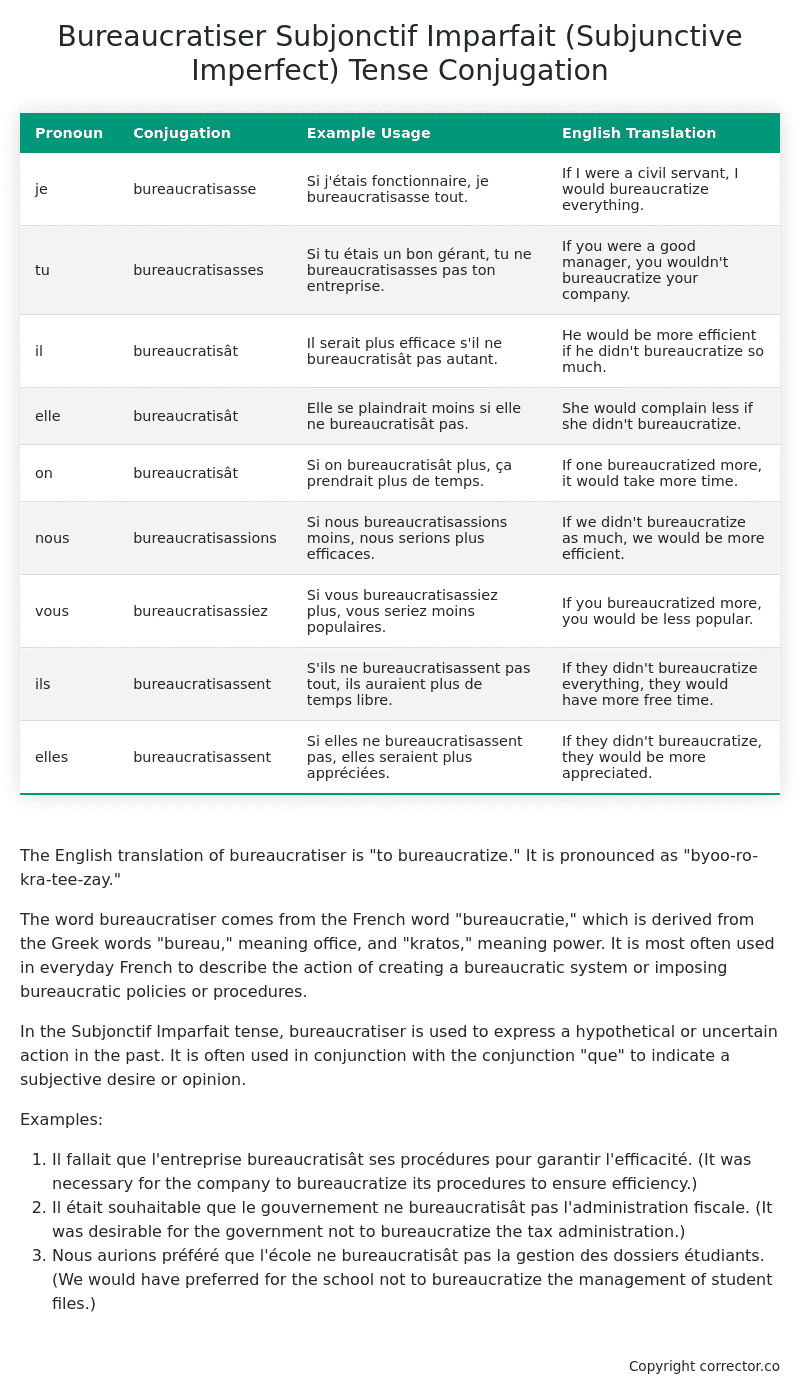Subjonctif Imparfait (Subjunctive Imperfect) Tense Conjugation of the French Verb bureaucratiser
Introduction to the verb bureaucratiser
The English translation of bureaucratiser is “to bureaucratize.” It is pronounced as “byoo-ro-kra-tee-zay.”
The word bureaucratiser comes from the French word “bureaucratie,” which is derived from the Greek words “bureau,” meaning office, and “kratos,” meaning power. It is most often used in everyday French to describe the action of creating a bureaucratic system or imposing bureaucratic policies or procedures.
In the Subjonctif Imparfait tense, bureaucratiser is used to express a hypothetical or uncertain action in the past. It is often used in conjunction with the conjunction “que” to indicate a subjective desire or opinion.
Examples:
- Il fallait que l’entreprise bureaucratisât ses procédures pour garantir l’efficacité. (It was necessary for the company to bureaucratize its procedures to ensure efficiency.)
- Il était souhaitable que le gouvernement ne bureaucratisât pas l’administration fiscale. (It was desirable for the government not to bureaucratize the tax administration.)
- Nous aurions préféré que l’école ne bureaucratisât pas la gestion des dossiers étudiants. (We would have preferred for the school not to bureaucratize the management of student files.)
Table of the Subjonctif Imparfait (Subjunctive Imperfect) Tense Conjugation of bureaucratiser
| Pronoun | Conjugation | Example Usage | English Translation |
|---|---|---|---|
| je | bureaucratisasse | Si j’étais fonctionnaire, je bureaucratisasse tout. | If I were a civil servant, I would bureaucratize everything. |
| tu | bureaucratisasses | Si tu étais un bon gérant, tu ne bureaucratisasses pas ton entreprise. | If you were a good manager, you wouldn’t bureaucratize your company. |
| il | bureaucratisât | Il serait plus efficace s’il ne bureaucratisât pas autant. | He would be more efficient if he didn’t bureaucratize so much. |
| elle | bureaucratisât | Elle se plaindrait moins si elle ne bureaucratisât pas. | She would complain less if she didn’t bureaucratize. |
| on | bureaucratisât | Si on bureaucratisât plus, ça prendrait plus de temps. | If one bureaucratized more, it would take more time. |
| nous | bureaucratisassions | Si nous bureaucratisassions moins, nous serions plus efficaces. | If we didn’t bureaucratize as much, we would be more efficient. |
| vous | bureaucratisassiez | Si vous bureaucratisassiez plus, vous seriez moins populaires. | If you bureaucratized more, you would be less popular. |
| ils | bureaucratisassent | S’ils ne bureaucratisassent pas tout, ils auraient plus de temps libre. | If they didn’t bureaucratize everything, they would have more free time. |
| elles | bureaucratisassent | Si elles ne bureaucratisassent pas, elles seraient plus appréciées. | If they didn’t bureaucratize, they would be more appreciated. |
Other Conjugations for Bureaucratiser.
Le Present (Present Tense) Conjugation of the French Verb bureaucratiser
Imparfait (Imperfect) Tense Conjugation of the French Verb bureaucratiser
Passé Simple (Simple Past) Tense Conjugation of the French Verb bureaucratiser
Passé Composé (Present Perfect) Tense Conjugation of the French Verb bureaucratiser
Futur Simple (Simple Future) Tense Conjugation of the French Verb bureaucratiser
Futur Proche (Near Future) Tense Conjugation of the French Verb bureaucratiser
Plus-que-parfait (Pluperfect) Tense Conjugation of the French Verb bureaucratiser
Passé Antérieur (Past Anterior) Tense Conjugation of the French Verb bureaucratiser
Futur Antérieur (Future Anterior) Tense Conjugation of the French Verb bureaucratiser
Subjonctif Présent (Subjunctive Present) Tense Conjugation of the French Verb bureaucratiser
Subjonctif Passé (Subjunctive Past) Tense Conjugation of the French Verb bureaucratiser
Subjonctif Imparfait (Subjunctive Imperfect) Tense Conjugation of the French Verb bureaucratiser (this article)
Conditionnel Présent (Conditional Present) Tense Conjugation of the French Verb bureaucratiser
Conditionnel Passé (Conditional Past) Tense Conjugation of the French Verb bureaucratiser
L’impératif Présent (Imperative Present) Tense Conjugation of the French Verb bureaucratiser
L’infinitif Présent (Infinitive Present) Tense Conjugation of the French Verb bureaucratiser
Struggling with French verbs or the language in general? Why not use our free French Grammar Checker – no registration required!
Get a FREE Download Study Sheet of this Conjugation 🔥
Simply right click the image below, click “save image” and get your free reference for the bureaucratiser Subjonctif Imparfait tense conjugation!

Bureaucratiser – About the French Subjonctif Imparfait (Subjunctive Imperfect) Tense
Formation
Common Everyday Usage Patterns
Interactions with Other Tenses
Subjonctif Présent
Indicatif Passé Composé
Conditional
Conditional Perfect
Summary
I hope you enjoyed this article on the verb bureaucratiser. Still in a learning mood? Check out another TOTALLY random French verb conjugation!


